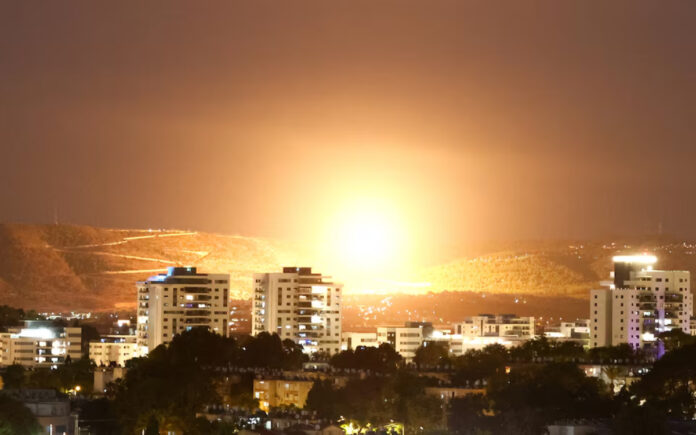Beirut: An Israeli airstrike on a municipal building in Nabatieh, a major town in southern Lebanon, has resulted in the deaths of 16 people, including the town’s mayor. This marks the largest attack on a Lebanese state building since the beginning of Israel’s ongoing air campaign. In addition to the fatalities, more than 50 people were injured, sparking outrage among Lebanese officials.
Lebanese authorities condemned the attack, stating it demonstrates Israel’s campaign against Hezbollah is now extending to the Lebanese state. Caretaker Prime Minister Najib Mikati accused Israel of deliberately targeting a meeting of the municipal council, which had been discussing services and relief efforts for those displaced by Israeli attacks.
Additional Strikes and UNIFIL Incident
In a separate incident, Israeli forces launched strikes on Syria’s Mediterranean port city of Latakia, according to reports from Syrian state media. Fires erupted at the scene, and Syrian air defenses were activated to confront the Israeli assault. Meanwhile, in southern Lebanon, the U.N. peacekeeping mission (UNIFIL) reported that an Israeli tank fired at one of its watchtowers, destroying cameras and damaging the structure. Israel has yet to comment on the incident, though it had previously requested that UNIFIL relocate its forces for safety reasons.
Israel’s Response
Israeli Defense Minister Yoav Gallant, during a visit to the northern border, reiterated that Israel’s military actions against Hezbollah would not cease, despite calls for negotiation. “We will hold negotiations only under fire,” he stated, as noted by his office. The ongoing military campaign aims to dismantle Hezbollah’s presence in southern Lebanon and safeguard Israeli towns near the border.
U.S. Involvement
The Pentagon confirmed that U.S. Defense Secretary Lloyd Austin spoke with Gallant, emphasizing the need for precautions to ensure the safety of UNIFIL personnel and the Lebanese Armed Forces. However, Israel has maintained its stance on continued military operations despite external concerns.
Hezbollah and Border Tensions
The escalation follows a year of tensions during which Hezbollah, backed by Iran, has fired rockets into Israel in support of Hamas militants in Gaza. Israel’s response has included the assassination of senior Hezbollah leaders and an extensive ground and air offensive in southern Lebanon.
Earlier in October, Israel issued an evacuation notice for Nabatieh, a city of tens of thousands, where Mayor Ahmed Kahil refused to leave. Despite international calls for restraint, Israel continues to target Hezbollah positions in the region, with recent operations dismantling a network of tunnels used by Hezbollah’s elite Radwan Forces.
Also Read | North Korea Amends Constitution, Declares South Korea a ‘Hostile State’
Beirut and Broader Impact
Israeli warplanes also resumed strikes on southern Beirut, a Hezbollah stronghold, marking the first attack in the capital since early October. Israeli operations in Lebanon have claimed over 2,350 lives in the past year, displacing more than 1.2 million people, according to the Lebanese Health Ministry. The U.N. reports that a quarter of Lebanon remains under evacuation orders.
The death toll includes both civilians and combatants, but it has also caused significant civilian casualties, including hundreds of women and children. During the same period, around 50 Israelis, both soldiers and civilians, have been killed in the conflict.
Also Read | Taiwan Official Warns of China’s Growing Military Threat Amid Drills
UNIFIL Relations
While Israel has previously criticized UNIFIL for its perceived failure to curb Hezbollah’s military activity, Israeli Foreign Minister Israel Katz struck a more conciliatory tone. He affirmed that Israel values UNIFIL’s presence and has no intention of harming its personnel. The 10,000-strong U.N. peacekeeping force includes troops from several European nations, creating tensions between Israel and key allies such as France, Italy, and Spain.



